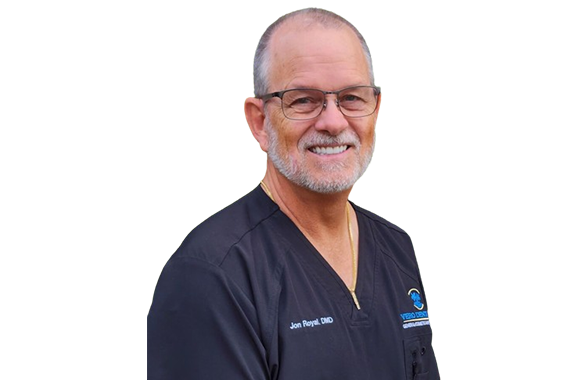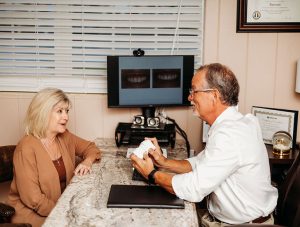You Don’t Have to Live with Jaw Pain
Temporomandibular Joint Disorder, commonly referred to as TMJ Disorder, is a condition affecting the jaw joint and surrounding muscles. This complex and often misunderstood disorder can cause significant discomfort and hinder daily activities such as eating, speaking, and even sleeping. At Vero Dental Spa, we specialize in diagnosing and treating TMJ Disorder to help you regain comfort and function.
If you deal with severe jaw pain, you may be suffering from TMD. Contact our 5-star-rated dentist in Vero Beach today to schedule an appointment by calling (772) 778-5550. We offer TMJ treatment to help you find pain relief.
What Is the TMJ?
TMJ stands for temporomandibular joint. It’s the joint that connects your jawbone (mandible) to your skull, specifically to the temporal bone in the skull. This joint allows you to open and close your mouth, move your jaw from side to side, and chew food. The TMJ is one of the most frequently used joints in the body. The TMJ is a complex joint with a combination of hinge and sliding motions. It’s surrounded by muscles, ligaments, and tendons that help control its movement.
What Is TMJ Disorder?
TMJ Disorder occurs when there are problems with the muscles and joints in the jaw. This can result from various factors, including injury, arthritis, or bruxism (teeth grinding). Understanding the root cause of your TMJ Disorder is crucial for effective treatment.
Types of TMJ Disorders
There are several types of TMJ disorders, each with its own unique set of symptoms and causes. Some of the most common types of TMD include:
- Myofascial Pain Disorder: The most common type of TMJ disorder. It’s characterized by pain or discomfort in the muscles that control jaw movement. Various factors, including stress, overuse of the jaw muscles, and trauma to the temporomandibular joints, can cause myofascial pain.
- Internal Joint Derangement: A type of disorder that occurs when the disc that cushions the joint becomes displaced or dislocated, causing pain, clicking or popping sounds in the jaw, and limited jaw movement. Trauma to the joint, arthritis, or a misaligned bite can cause internal derangement.
- Degenerative Joint Disease: A disorder that occurs when the cartilage in the jaw joint wears away over time, leading to bone-on-bone contact, pain, and limited jaw movement. Degenerative joint disease can occur from aging, trauma to the joint, or other joint diseases.
- TMJ Ankylosis: A rare but serious TMJ disorder that occurs when the jaw joints become fused, preventing normal jaw movement. Trauma to the joints, infection, or certain medical conditions can cause TMJ ankylosis.
Symptoms of TMJ Disorder
TMJ disorder can manifest through various symptoms, which can range from mild to severe. Some of the most common symptoms include:
- Jaw Pain: Persistent pain in the jaw joint or surrounding areas.
- Headaches: Frequent headaches, especially in the temples.
- Ear Pain: Discomfort or ringing in the ears.
- Difficulty Chewing: Pain or discomfort when chewing food.
- Clicking or Popping: Sounds when opening or closing the mouth.
- Lockjaw: Difficulty opening or closing the mouth.
If you’re experiencing these signs of TMD, it may be time to schedule an appointment with our dentist in Vero Beach, FL. We’ll examine your condition, recommend treatment, and help you understand what you shouldn’t do with TMD.
Causes of TMJ Disorders
The exact cause of temporomandibular disorders isn’t always clear, but the following factors may contribute to the development of the condition:
- Injury: Trauma to the jaw or head can damage the TMJ.
- Arthritis: Degenerative joint conditions such as osteoarthritis or rheumatoid arthritis.
- Bruxism: Chronic teeth grinding or clenching.
- Stress: High levels of stress can lead to jaw tension and TMJ issues.
- Misaligned Bite: Improper alignment of the teeth can strain the jaw joint.
Risk Factors of Developing TMD
You may be at a higher risk of developing a temporomandibular joint disorder if you possess any of the following:
- Jaw Injuries: Trauma to the jaw, from a car accident or sports injury, can increase the risk of developing TMD.
- Teeth Grinding or Clenching (Bruxism): Habitual teeth grinding or clenching, often caused by stress or anxiety, can put excessive pressure on the jaw joint and surrounding muscles.
- Arthritis or Other Joint Diseases: Conditions that cause inflammation or damage to the joints, such as osteoarthritis or rheumatoid arthritis, can increase the risk of TMD.
- Dislocation or Displacement of the Jaw Joint Disc: The jaw joint has a disc that helps cushion and stabilize it. If this disc becomes displaced or dislocated, it can cause TMJ symptoms.
- Genetics: Some people may be more genetically predisposed to developing TMD.
- Poor Posture: Poor posture, particularly in the neck and shoulders, can contribute to muscle tension and pain in the jaw and surrounding areas.
- Gender: Women are more likely than men to develop TMJ disorders.
- Age: TMD is more common in people between the ages of 20 and 40, but it can occur at any age.
Diagnosing TMD
If you’re experiencing symptoms of TMD or TMJ pain it’s crucial to seek medical attention from a dentist or doctor. They’ll perform a thorough evaluation of your symptoms and medical history and may also perform a physical exam of your joint and surrounding facial muscles. In some cases, imaging tests such as X-rays or an MRI may be used to help diagnose the condition.
Treatment Options for TMD
When it comes to treating TMD, there are various options:
- Lifestyle Changes: Reducing stress and avoiding hard or chewy foods.
- Medications: Pain relievers, muscle relaxants, or anti-inflammatory drugs.
- Physical Therapy: Exercises to strengthen the jaw muscles and improve flexibility.
- Dental Appliances: Custom-made splints or mouthguards to prevent teeth grinding.
- Surgery: In severe cases, surgical intervention may be necessary.
Relieve TMJ pain by contacting our dentist today. Our goal is to provide a comprehensive treatment plan that addresses both the symptoms and underlying causes of TMJ Disorder.
Prevention of TMD
While some causes of TMD are beyond our control, there are several steps you can take to reduce your risk of developing the condition. Prevention tips include:
- Practice Good Posture: Avoid slouching, which can strain your jaw.
- Manage Stress: Techniques such as meditation and deep breathing can reduce jaw tension.
- Avoid Overuse: Limit activities that strain the jaw, such as chewing gum or biting nails.
- Regular Dental Check-Ups: Routine visits to Vero Dental Spa can help catch and address early signs of TMJ issues.
Frequently Asked Questions
Is TMJ disorder a common condition?
Yes, TMJ disorder is a relatively common condition that affects millions of people worldwide. It’s more common in women than men and often affects people between the ages of 20 and 40. The exact prevalence of TMD is difficult to determine because many people don’t seek medical attention for their symptoms or are misdiagnosed with other conditions. However, research suggests that up to 12 percent of the population may experience some form of TMD at some point in their lives.
Can children develop TMJ disorders?
Yes, children can develop TMJ disorders, although it’s less common than in adults. Some common causes of TMD in children include jaw injuries, misaligned teeth or jaws, and habits such as nail biting, gum chewing, or thumb sucking.
Can TMJ Disorder go away on its own?
In some cases, TMJ Disorder may resolve without treatment. However, persistent or severe symptoms often require professional intervention.
What should I do if my jaw locks?
If you experience jaw locking, try to relax the muscles and gently massage the area. If the issue persists, seek immediate medical attention.
Seek Soothing Relief for Facial Pain
TMD can cause uncomfortable and painful symptoms that can negatively affect a person’s quality of life. However, with the right treatment plan, most people with TMJ disorders can manage their symptoms and improve their jaw function.
If you’re experiencing any symptoms of TMD, contact our dentist in Vero Beach at (772) 778-5550 to schedule an appointment. From physical therapy to dental appliances, we’ll help find the best TMJ treatment for you.

Get Your Complimentary
Consultation or 2nd Opinion
- Exam
- Full mouth X-ray
- Private Consultation with Doctor ($350 value)
- 3036 20th St,
Vero Beach, FL 32960 - (772) 778-5550
Working hours
- Monday: 8am - 5pm
- Tuesday: 8am - 5pm
- Wednesday: 8am - 5pm
- Thursday: 8am - 5pm
- Friday: 8am - 1pm
- Saturday & Sunday: Closed


